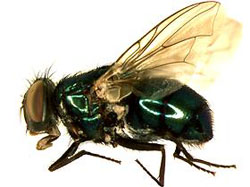The flies can help investigators pinpoint time of death
At crime scenes, there are the obvious clues: DNA, fingerprints and blood stains.
Then, there are the maggots.
And in New Jersey, few – if any – know maggots better than Lauren Weidner, a Rutgers graduate student whose research in the growing field of forensic entomology could make her the state’s most unlikely crime fighter.
Weidner studies maggots, also known as blow flies, which can descend upon a corpse within minutes of death and provide valuable information on the time someone died.
While bodies decompose at different rates, the life cycle of blow flies and their larvae is more predictable, making them the perfect forensic yardstick -- even if they’ll never star on CSI.
“You work backwards to determine when the eggs were laid,’’ says Weidner.
But because there are 14 species of blow flies in New Jersey, and their life cycles can vary as much as 12 hours depending on temprature, Weidner is documenting the differences so investigators can more accurately pinpoint a time of death.
That’s why her research could have a big impact on New Jersey crime scenes, says George Hamilton, director of graduate program in entomology and department chair.
“It’s work no one in New Jersey, or several nearby states, has ever done before,’’ he says.
Weidner’s research can also help investigators figure out where someone was killed.
“If there aren’t a certain species of blow fly where the body was found, but there are maggots from that

species on the body, that can be a clue,’’ she says.
Weidner, who lives in North Brunswick, loves her job, but she’ll be the first to admit it’s not for the fainthearted – or the easily nauseated.
“I collect maggots off dead bodies,’’ she says bluntly. “You have to have a very strong stomach. If you’re someone who’s very sensitive or emotional, it’s not a good job for you.”
Weidner’s career path in forensic entomology began in a Long Island crime lab where she was interning as a forensic science major. “They had blow flies in the lab and I found that really interesting, so I decided to go to school for it,’’ says Weidner, who grew up in the Suffolk County town of Medford. “I always liked insects as a kid. And I like forensic science because it’s always changing. It doesn’t get dull.’’
In addition to her lab work, Weidner, who won a Rutgers Dissertation Teaching award for graduate students, will be teaching an undergraduate course in Forensic Entomology in the spring.
But lately, she has spent much of her time in the field, observing and collecting blow flies, many of which are iridescent green or blue but smaller than the shiny green horseflies that bite beach goers.
Weidner’s main method of collecting the flies is to lure them with a “beef liver trap,” although one of her studies involved logging the succession of insects that lit upon a pig carcass in various stages of decomposition.
True to their reputation, the blow flies showed up first. “Then there will be different kinds of beetles, which feed on the maggots. When the skin begins to dry, there’s another family of beetles that only feed on dry skin and tissue,’’ she says, rattling off the list.
Blow flies are attracted to dead bodies because they seek a warm, moist protein-rich source to lay their eggs. They swarm on dung for the same reason. But they also enjoy pollen from flowers.
At her Rutgers lab, Weidner keeps a few hundred live flies, which have a lifespan of about a month. While she doesn’t get attached to them, she does feel a pang of guilt when it’s time to make way for a fresh batch of flies.
“We put them in the freezer to kill them. It slows them down and then they die. I think that's the nicest way to do it,'' says Weidner.
Although it can be hard to feel anything other than revulsion toward flies, Weidner hopes people will realize they play a valuable role in the circle of life.
“If it weren’t for flies, it would take a lot longer for decomposition to occur and there would be more dead bodies and road kill lying around,’’ she says. “The stigma needs to be lifted.’’